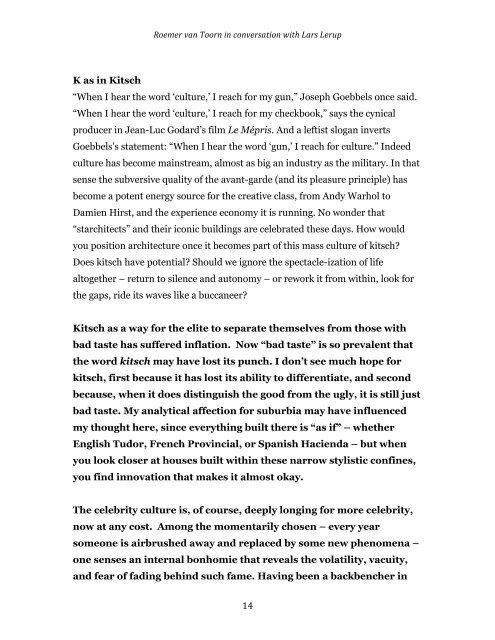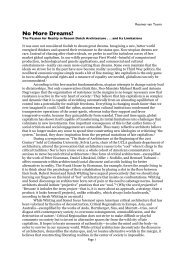ABCD Lars & Roemer
ABCD Lars & Roemer
ABCD Lars & Roemer
Create successful ePaper yourself
Turn your PDF publications into a flip-book with our unique Google optimized e-Paper software.
K as in Kitsch<br />
<strong>Roemer</strong> van Toorn in conversation with <strong>Lars</strong> Lerup <br />
“When I hear the word ‘culture,’ I reach for my gun,” Joseph Goebbels once said.<br />
“When I hear the word ‘culture,’ I reach for my checkbook,” says the cynical<br />
producer in Jean-Luc Godard’s film Le Mépris. And a leftist slogan inverts<br />
Goebbels’s statement: “When I hear the word ‘gun,’ I reach for culture.” Indeed<br />
culture has become mainstream, almost as big an industry as the military. In that<br />
sense the subversive quality of the avant-garde (and its pleasure principle) has<br />
become a potent energy source for the creative class, from Andy Warhol to<br />
Damien Hirst, and the experience economy it is running. No wonder that<br />
“starchitects” and their iconic buildings are celebrated these days. How would<br />
you position architecture once it becomes part of this mass culture of kitsch?<br />
Does kitsch have potential? Should we ignore the spectacle-ization of life<br />
altogether – return to silence and autonomy – or rework it from within, look for<br />
the gaps, ride its waves like a buccaneer?<br />
Kitsch as a way for the elite to separate themselves from those with<br />
bad taste has suffered inflation. Now “bad taste” is so prevalent that<br />
the word kitsch may have lost its punch. I don’t see much hope for<br />
kitsch, first because it has lost its ability to differentiate, and second<br />
because, when it does distinguish the good from the ugly, it is still just<br />
bad taste. My analytical affection for suburbia may have influenced<br />
my thought here, since everything built there is “as if” – whether<br />
English Tudor, French Provincial, or Spanish Hacienda – but when<br />
you look closer at houses built within these narrow stylistic confines,<br />
you find innovation that makes it almost okay.<br />
The celebrity culture is, of course, deeply longing for more celebrity,<br />
now at any cost. Among the momentarily chosen – every year<br />
someone is airbrushed away and replaced by some new phenomena –<br />
one senses an internal bonhomie that reveals the volatility, vacuity,<br />
and fear of fading behind such fame. Having been a backbencher in<br />
14






